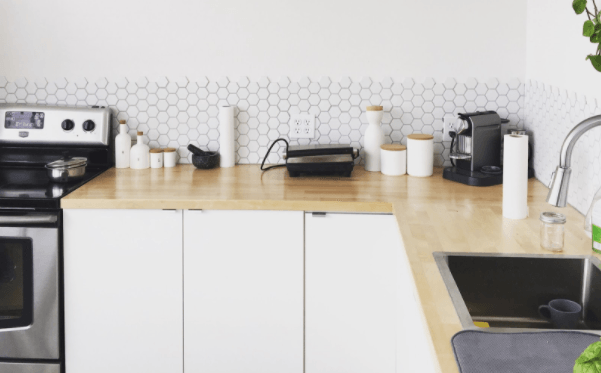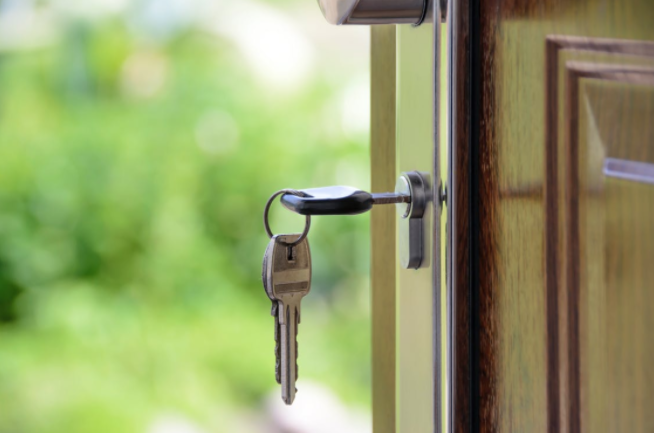Ways to Prevent Burglars That Take Only Seconds

At Sonitrol, we are always looking to be on the cutting edge of security technology. Sometimes, though, preventing a theft can be as easy as locking your door. Here are a few ways to prevent burglars that take only a matter of seconds.
Lock Doors and Windows
We often overlook locking doors and windows, despite the fact that it’s one of the best ways to prevent burglars. Often, criminals will try doors or windows first to see if they are unlocked, and then simply walk into your home.
Whenever you leave the house or go to bed at night, make sure your doors or windows are locked. While it might be tempting to leave the house unlocked for a few moments to run an errand, take those few seconds to secure your home, no matter how long you will be gone.
Install Curtains
The perfect curtain can do more than just pull a room together- it can also deter thieves. Many burglars peak into windows to see if there is anything worth breaking in for. Thicker curtains can deter thieves by keeping your rooms away from prying eyes.
Put Away Toys
Leaving expensive toys, like bicycles, out on the front lawn can signal to thieves that you may have something inside worth stealing. To prevent this, have your children put away their toys when they are finished playing with them. Also consider taking other expensive items like grills inside to prevent the same issue.
Don’t Hide Spare Keys Outside
At some time in your life, you’ll lock yourself out of the house. While it’s tempting to leave a key hidden in case of this situation, consider that most thieves have caught on and can easily find the key for their own use. Instead of hiding your keys somewhere outside, give them to a trusted neighbor so that you still have a back up plan while keeping your home secure.
Check Your Mail
An overflowing mailbox signals to a burglar that you are not home and that your house is an easy target. Picking up your mail everyday and newspaper can prevent an unwelcome surprise when you get home. If you are leaving town, ask a neighbor to pick up your mail and newspaper everyday to make it look as if you are still coming and going.
Security does not have to be complicated, and the easiest ways to prevent a burglary can be quite simple. Yet the tips we outlined above should not be the only ones to follow. Comprehensive home security also requires advanced technology, like our Sonitrol systems, to make your home truly safe from burglaries.
At Sonitrol, we would love to talk to you about the best ways to prevent burglaries and the best security system for you. Contact us today to see what Sonitrol SC can do for you.
How to Prevent a Break-In

Did you know that approximately 30% of burglars enter homes through an unlocked door or window? And once they’ve gained access, these thieves can burglarize your home in less than 10 minutes. If you want to prevent a break-in and not become part of a statistic, it’s important to take preventative measures.
Check out our tips for prevent burglars from breaking in to your home:
Lock Your Doors and Windows
Locking doors and windows may seem like an obvious task, but as the statistic above shows, it’s easy to forget. Everytime you leave your home, double check to make sure that your windows and doors are closed completely and locked. You may also consider getting a deadbolt lock for your door to prevent forceful entry into your home.
Invest in Motion Detecting Lights
Motion detecting lights are one of the best ways to prevent a nighttime break-in. The better-lit your home is, the less likely a burglar will attempt to break in. Additionally, motion detecting lights can act as a built in light when you return home late at night. You can get motion detecting lights either hardwired or screwed into the outside of your house.
Get a Dog
Burglars are also less likely to break into a house with a dog. Dogs are highly unpredictable and can be very loud, drawing unwanted attention to a burglar’s presence. But if you aren’t prepared to love and care for your new furry friend, getting a dog is not the right option for you.
Talk to Your Neighbors
Your neighbors are perhaps one of the best resources when it comes to preventing a burglary. Talking to your neighbors can give you a better understanding of what’s going on around your home. They may have information about what’s going in the neighborhood, such as suspicious persons or cars lingering around your home.
And if you leave for vacation, ask your neighbors to help make your home looked ‘lived in’ while you’re gone. By picking up mail and taking in the garbage for you, your neighbors can deter would be intruders.
Install a Security System
Home security systems and alarms are a powerful deterrent to potential burglars. From burglary monitoring to video surveillance, there are a number of home security options to fit your needs. Installing a home security system is an easy way to prevent a break-in, and well worth the investment.
Sonitrol home security systems come with stickers and yard signs that let burglars know your home is well protected. Learn more about how Sonitrol’s state-of-the-art systems can help prevent a break-in and protect your home.
How to Protect Your Family During a Home Invasion

The difference between a home invasion and a burglary is simple: a burglary occurs when an intruder breaks in while you are not home, while a home invasion occurs while you are at home. While both are dangerous, home invasions often pose a greater threat to your safety and the safety of your family.
Below are steps you can take to protect yourself and your family during a home invasion.
Take Preventative Measures
First and foremost, you should take preventative measures to protect your home and family. Trim trees and bushes around your home to prevent potential burglars from hiding in them. Make sure that all doors and windows are secure and locked. You should also stay alert to suspicious people or cars near your home.
Call 911
Unfortunately, even the best plans and preventative measures can fall short. If you are home and someone breaks into your house, calling the police is absolutely the first thing you should do. Answer their questions thoroughly and take their advice. Try to stay on the line until the police arrive.
Flee or Hide…
Attempting to leave the house is the next thing you should do after you call the police. If this is difficult and cannot be done safely, find a place to hide. If you are in your bedroom, lock the door and keep still, or find another place to hide, such as a closet, until help arrives.
Then Fight
The last thing you want to do is confront the invader. You have no idea who this person is and what this person may be carrying as a weapon. Sometimes, though, you must fight back to protect yourself or to protect your family. If you have to fight, go for vulnerable areas such as the knee or the face. Do anything that you need to do to keep yourself safe. When the invader is incapacitated, leave the area immediately.
Even though a home invasion is stressful, the biggest thing to do is to stay calm. Acting irrationally can lead to a situation where someone gets hurt, including your loved ones. Go over these steps with your family to make sure that everyone knows what to do if a home invasion arises, including escape routes and emergency plans.
One of the best ways to protect your home from invasion? Install a home security system. Security systems and security decals will help deter potential invaders from targeting a home.
At Sonitrol, we offer comprehensive home security solutions that can give you and your family peace of mind. You can also visit our blog for more tips and advice on protecting your home and family in many situations, not just a home invasion. Reach us online or at (843) 747-0904 to see what Sonitrol can do for you.
Home Electrical Safety Tips

Although we use electric appliances around the house every day, these appliances can pose a serious electrical hazard. Light bulbs, appliances, and power cords all have the potential to start a fire. To protect yourself, your children, and your home, here are five do’s and don’ts for home electrical safety.
Do: Pay attention to your breaker
A tripped breaker is not only extremely frustrating, but also potentially dangerous. If your breaker trips immediately after resetting, it could be a symptom of a dangerous problem. If you continue to reset it, you may cause a serious electrical fire.
A professional electrician can diagnose the issue, which may be a faulty box, too great of an electric load, or a fire hazard. Some houses built in the 1990s or earlier were installed with breaker models that are now discontinued due to fire hazards. If your box was manufactured by Federal Pacific, ITE Pushmatic, Zinsco, or GTE/Sylvania, buy a replacement.
Don’t: Put water on an electrical fire
Throwing water on a fire is an almost instinctive reaction. However, since water conducts electricity, it will worsen an electrical fire. Only a chemical fire extinguisher can safely combat an electrical fire. It is important to always have a fire extinguisher handy, especially in the kitchen.
Follow the firefighter-recommended PASS method for using your fire extinguisher. First, pull (P) the safety pin of the fire extinguisher. Next, aim (A) the nozzle and squeeze (S) the handle at the base of the fire. Sweep (S) the extinguisher in a side-to-side motion until you have put out the flames.
If you aren’t sure if you can fight the fire, run. Although losing your house and possessions is devastating, losing your life is much worse.
Do: Teach children electrical safety
Since children are naturally curious, it is easy for an electrical accident to occur. To prevent a hazardous situation, teach children to unplug appliances after use and to never play with electrical appliances near water.
Use child-proof caps in unused outlets, and keep electrical cords out of reach of pets and young children. It’s also a good idea to create and practice a home fire escape plan with your children.
Don’t: Ignore hot outlets
An outlet or breaker that is hot to the touch is one of the most immediate signs that something is wrong. A hot outlet could mean that the electrical load is too high, the wiring is melting, or the wiring has come loose. Investigate flickering lights, another indicator of loose wiring.
Whenever you are concerned about the safety of your home electrical outlets, you should contact a licensed electrician.
Do: Ground your appliances
Appliances with a three-prong plug are the safest options for your home. Old appliances are particularly at risk for electrical malfunctions and should be updated to three-prong plugs. Without properly grounding your appliances, you could be at risk for electrical shocks. Replace outlets that aren’t grounded and install a new circuit. You will likely need an electrician to repair or install the outlets.
At Sonitrol, home safety is our priority. We offer state-of-the-art home security technology, including wireless monitoring, burglary monitoring, and security cameras. To learn more about how to protect your home, contact our expert team at (843) 747-0904.
Tips to Hurricane Proof Your Home

Every coastal resident knows the stress and panic that accompanies an approaching hurricane. While evacuating family and pets is necessary in some situations, you’ll want to do everything possible to hurricane proof your home.
Hurricane season may be months away, but it’s never too early to begin hurricane proofing your home. Get a head start preparing your house for hurricane season with these tips.
Protect windows and doors
Windows and doors are the most vulnerable spots in your house and need extra protection during a storm. Install specialized storm shutters or impact-resistant glass to prevent them from shattering. If the glass is broken, it could hurt the people or pets inside of your home as well as let in wind and rain.
Garage doors are also weak points for strong winds. Brace the door or install garage doors that are built to withstand the pressure.
Clean up your yard
When strong gusts of wind blow through your yard, they can uproot trees and move outdoor furniture. Prune dead branches and cut back any limbs that have grown close to your house. Overhanging branches or dead tree limbs could easily fall onto your roof in the event of a storm.
Patio furniture, grills, and other heavy items should also be moved from the yard. Make sure all tools and sharp objects are securely stored in a shed instead of lying near the back door.
Design your house properly
Although many of us don’t get the luxury of building our own custom home, modifications can be made to existing homes to help them withstand storms. One important consideration is uplift, which occurs when strong gusts of wind blow the roof off of a house. Many houses are equipped with code-mandated fasteners that are designed to protect the house from quite literally being torn apart.
Your location and type of construction will determine the fasteners you use, which range from tie-down, embedded connectors, lateral anchors, and others. You will also want to build your house on the highest ground possible or with raised structures in the event of a storm surge.
Clear drainage systems
Hurricanes and tropical storms cause heavy rains, which can often seep into and flood houses if you aren’t careful. One simple precaution is clearing all drainage systems like gutters and downspouts so that the water can flow uninhibited. A visual inspection should show if your drainage systems are clear and ready for the storm.
You can also hire someone to professionally clean your gutters if they are in poor condition. You’ll also want to stock up on towels and buckets indoors in case water leaks from the attic or seeps in through cracks.
Run a backup generator
In a hurricane or storm, the power is often the first thing to go off, and it could be hours or even days before it’s restored. You should always have a backup generator on hand, even if you don’t live in a hurricane-prone area. Choose from a small standby generator or a whole-house system.
In some cases, a backup generator can mean the difference between life or death. Be sure to check with local zoning regulations on the type of generator allowed, as many models can be loud.
Install a security system
Unfortunately, criminals often take advantage of empty houses whose residents have evacuated during a storm. Homes and businesses are frequently robbed during, before, or after storms. A home security system can protect your home from theft and break-ins.
Choose a security system with cameras and an alarm system that will notify the police if someone breaks into your home. Security systems can protect your home year-round and provide peace of mind.
At Sonitrol Security Systems, we are committed to protecting our customers’ homes and property with advanced, top-of-the-line technology. Schedule a free consultation today, or chat with our expert team at (843) 747-0904.
How to Make a Home Safe for Children

Although your home may be safe for an adult, everyday objects can be surprisingly dangerous to children. In fact, household injuries are one of the top reasons children under three are taken to the ER. If you’re expecting a child or already have children, make sure you know how to make a home safe for children.
Here are five tips for making your home as safe as possible for your little ones.
Childproof the kitchen
One of the most potentially dangerous rooms in the house is the kitchen. To prevent injuries, store knives, scissors, and other sharp objects in a locked cabinet or drawer. Consider keeping your dishwasher locked as well so that children cannot hurt themselves opening it or with the items inside.
You should also keep children away from hot stoves, and begin practicing the “no” command with your child. Finally, restrict entry to the kitchen with a baby gate.
Hide cleaning products
Many kitchen and bathroom cleaners are extremely toxic if ingested. Keep laundry detergents and all cleaning products out of reach in a locked cabinet. Medicines and creams should also be kept out of reach, as these can be harmful or even deadly when used improperly.
Keep pet food in locked containers, and make sure insect sprays are also kept out of reach. If you suspect that your child has ingested something, contact the poison control center immediately.
Remove choking hazards
Small, everyday objects can pose a serious choking hazard to curious children. Even the most seemingly harmless objects can have disastrous results if your child gets ahold of it. Round or oval objects that are less than an inch in diameter can block a young child’s throat and cause fatal choking.
To prevent your child from choking, keep hazardous items out of their reach, and always keep an eye on your children when they are playing with small toys like Legos or even broken crayons, as these objects can pose a serious risk.
Fasten furniture to the wall
Heavy furniture, such as dressers, should always be fastened to the wall to prevent them from falling on a young child. Mount TVs to the wall instead of on a table that they can fall off of. Children are either at risk of the item falling directly on them or beside them where they could cut themselves walking over the glass.
Other items that could fall on your child and hurt him include breakable items like photo frames and glass decorations. If your child knocks over a porcelain accent or a photo frame and shatters the glass, it could cause serious injuries.
Install a security system
Parents are natural worriers, and it can be hard to achieve peace of mind when worrying about your child’s safety. You may hesitate to even leave your child with a babysitter if you are truly worried for his or her well-being. A home security system is the perfect way to add an extra layer of protection for your child.
Installing security cameras may also provide peace of mind since you can check up on your child while you are out of the house. Security systems will also alert law enforcement if a break-in is detected. Security systems protect your family and will immediately call the police in situations where you may not be able to.
At Sonitrol Security Systems, we want your home to be safe, peaceful, and happy. Your family’s safety is our number one priority. Contact us today online or at (843) 747-0904 to see how Sonitrol can help protect your family.
Caring for Pets During an Emergency

During emergencies, caring for pets should be one of your top priorities. The best way to ensure that all of your pet’s needs are met in the event of an emergency is through planning and preparation.
Here are some tips on how to prepare and take care of your pet during an emergency.
Evacuating? Bring Your Pets
First thing’s first: if you need to evacuate the area due to an emergency, bring your pet. Don’t assume that they will be okay in the house, even if they have a feeder and plenty of water. If it isn’t safe for you, then it isn’t safe for your pets.
Prep Food & Any Medications
Every family should have an emergency kit handy in the event of an incident or evacuation. If you have a pet, make sure you consider their needs when putting your emergency kit together. Include any medications your pet takes. You can even ask your veterinarian for an extra prescription to include in your emergency stash.
In case of an evacuation, make sure you bring food and water for your pet. Store their travel food, water, and medicine in the same area along with your emergency kit. Then, in case of an emergency, you can grab quickly.
Comfort Your Pets
Once you have left, check to see how your pet is doing. They might be shaking or nervous due to the stress of your abrupt exit. Try to stick to a familiar schedule like at home, such as regular eating and bathroom times. Also, give them lots of water. If your pet becomes ill, take them to a vet; it may be a result of stress or anxiety.
Next time you are at your vet’s office, ask the staff for tips on helping your pet during emergencies. Call a local animal shelter or pet boarder and see what options they offer in case of emergencies.
Remember, if you’re leaving town for an emergency, then your pet needs a safe place to go, too. So prepare for them, stay organized at home, and keep them safe.
Staying Safe on Your College Campus

College can be a fun and exciting time for students. You’re living on your own for the first time, and the experience comes with many adventures. However, these adventures can also lead to some unfortunate events, meaning students should take college campus safety seriously.
Crime occurs even in the safest college towns. Give yourself – and your parents – some peace of mind and follow these tips for staying safe on your college campus.
Know the Area
Become familiar with the area that you live and study in. You don’t want to ever be in a situation where you feel lost. If you know the campus, street names, and city, you’ll be able to get home late at night. You should also know alternative routes to get home in case of a local emergency or event, like a parade.
Visit the Campus Safety Office
Know where your Campus Safety Office is located and become familiar with it. Go inside, take some of the informational pamphlets and flyers, and talk to some of the people who work there. These pamphlets, and especially the experienced staff, can give you great tips on staying safe while you are having fun in college.
Lock Your Doors
Everytime you leave your house or dorm, lock your door. Sometimes students think that their door will be fine if unlocked for a moment but don’t take that risk. Remember, you have your whole life inside of there. And don’t forget to lock the door when you’re going to sleep.
Stay Safe in Numbers
Whether you’re heading in from a night out with friends or just walking home from the library, try to travel in numbers. You should never walk home by yourself. If there is no one to take you home, call an Uber or cab. If you must walk home alone, be aware of your surroundings and walk in well lit, populated areas.
Keep Your Phone Charged
You never know when you’re going to need your phone! Make sure your phone has enough battery before leaving the house, and bring a charger with you if it isn’t. Also keep your phone on your physical body, not in your bag. You don’t want to waste time digging around when an emergency situation strikes.
College should be one of the best experience of your life. Understanding college campus safety will help ensure that’s the case. Taking small steps like the ones listed above will keep you safe from harm and allow you to enjoy all that college has to offer.
Safety Rules Every Child Should Know

As a parent, your main priority is your child’s safety. One of the best ways to keep your children safe is to teach them basic child safety rules and procedures. Taking the time to inform your child about the basics of personal safety will help them be better prepared in the event of an emergency.
While many aspects of personal safety might seem obvious to you, they may not to your child. Below are safety rules and procedures that every child should know.
Using an Emergency List
In every household, there should be a list of emergency numbers. Numbers should include 911, and contact information for trusted family members and friends. Inform your children when these numbers might be necessary and where to find them. The refrigerator is a good place to put an emergency contact list.
Knowing Contact Information
Your children should know and memorize basic contact information as soon as they are able. This information includes their full name, home address and their parents’ names and phone numbers. This information can be extremely useful, especially if they ever find themselves lost.
Operating a Security System
If your child is old enough and responsible enough, explain to them the importance of the security system and what it is used for. Teach your children what to do when the alarm goes off, both in the case of an accident and an actual emergency.
Remembering Stranger Safety
The basics of stranger safety are extremely important. Tell your child not talk to strangers or take anything from someone they don’t know. If your child walks home from school, remind them never to go anywhere with a stranger. Explain to your children to never open the door for anyone, especially for strangers, when you are not home.
Keeping Away from Medicine
Until they reach a certain age, your children should not be going into the medicine cabinet. If they need something, they need to ask an adult to get it and administer the proper dosage. If you have younger kids, consider getting a lock for the medicine cabinet.
Understanding Fire Safety
Don’t let your child play with fire, and always watch them around an open flame like a candle. Explain the dangers of fire and why it’s never okay to play with fire. You can also take the opportunity to also go over your family’s evacuation plan in the event of a fire.
Crossing the Road
Lastly, teach your children to cross the road correctly. This includes looking both ways twice, and using crosswalks. Additionally, tell your children to never play in or alongside the road.
By understanding these basic safety rules, your child will be better prepared in the event of an emergency. Not only will this help keep them safe, but it will also give you peace of mind.
With Sonitrol security systems, you can add an extra layer of protection for your home and loved ones. Learn more about our residential security systems and how Sonitrol can help keep your family safe.
How to Detect a Burglar

Burglars these days will often watch the home they are interested in before attempting a robbery. They look for specific patterns and try to determine how difficult it will be to break into a house. While this is worrisome, there are fortunately ways to detect a burglar before they can strike.
Below is a list of things to look out for to prevent a burglary from occurring in your home.
An Unfamiliar Car
One of the first signs that a burglar might be targeting your house? An unfamiliar car parked on your street. Burglars will often park outside of a house for long stretches of time; perhaps a few hours, or over the course of a few days.
If you notice a suspicious car, check with your neighbors to see if they recognize it. You should also keep track of how long the new car stays there.
Strangers & Solicitors
Oftentimes when a burglar is targeting home, they will hang around the house or disguise themselves to get intel. Perhaps uncertified workmen or solicitors will knock on your door, asking to use the bathroom or to take a look in your house.
Never let a workman you did not call for or a solicitor inside your home. They may be trying to figure out the layout of your house and the valuables you may have inside.
Pictures
Speaking of strangers, keep an eye out for people that walk by that stop to take a picture of your home. If they take a picture and then just walk away, this is a good sign that your house is being targeted and that you should be cautious of a potential burglary.
Spam Mail
If you start noticing lots of meaningless spam mail, like flyers, in your mailbox or on your doorstep, this could be an warning. The burglar is taking advantage of delivering mail to get a better look at your house.
If you start noticing an increase in the amount of spam mail you are getting, ask you mailman if he is delivering them. If he isn’t, keep a look out for the person handing them out. Ask your neighbors if they are receiving them as well. The burglar could be watching their homes, too.
Strange Markings
Some burglars will place strings on walkways, lamp posts or your house as a tool for the planning of the robbery. The strings alert other burglars that the house is a potentially easy target. If you notice strings or other signs like litter in strange places around your home, remove them immediately.
Burglars are creative, and are always trying to find new ways to rob your home. Fortunately, their tactics are easily detectable. If you notice any of these signs, report it your police department to keep your property, and your life, safe.
Protect your home from burglars with a comprehensive security system from Sonitrol. We provide the highest quality residential security services to keep your home safe and secure. Contact Sonitrol for more information.
How Burglars Are Using Social Media

Social media has become a huge part of everyday life. People are constantly sharing photos, statuses, and other updates letting their followers know where they are and what they’re doing. Unfortunately, this can put people at risk, with burglars using social media to target certain homes and individuals.
Most applications use location services, often telling people where we are without our knowledge. This gives burglars an upper hand. Below are a few ways that burglars are using social media to their advantage, as well as some tips for preventing them.
Casual Facebook Friends
Many of us have Facebook friends who we have grown apart from or didn’t know very well to begin with. . Remove these people as your friends, as well as any unknown followers on other social media networks.
Additionally, make sure that your social profiles are private. That way, prying eyes will not have access to your personal information and whereabouts.
Facebook Check-ins
When traveling, people often “check in” at airports, hotels, or their destination on Facebook. Checking in at the airport or at a location in a different city lets a burglar know exactly where you are, and also indicates you’ll be gone for some time. Burglars then have plenty of time to commit a robbery.
The Location Feature
Many social media applications share your location whenever you post. Facebook includes your location automatically, while other applications let you choose whether or not to add your location. Fortunately, you can go to your personal settings and turn the location feature off.
Google Street View
Google Street View gives burglars a panoramic view of the area around your home. While there isn’t much to prevent burglars from using this feature, you should still be aware that Google Street View is a potential casing tactic.
Vacation Photos
We often want to show off the beautiful places we’re visiting while on vacation, updating Instagram and Facebook with photos of our trip. Our tip? Wait to upload your vacation photos until after you’ve returned home. That way, a potential burglar cannot take advantage of your being away from home.
Social media is a great way to communicate and connect with people all over the world, but it’s important to be cautious of the potential dangers of social media. Use these tips to protect your home while you’re away.
Interested in extra protection against burglars? Contact Sonitrol to learn about our comprehensive home security solutions.
How to Secure a New Home

Moving into a new home can be fun and exciting, but it can also be stressful. From logistical issues to decorating, a lot of effort goes into moving. With all the commotion, it can be easy to fall behind on certain aspects of your move. But knowing how to secure a new home is an important part of the moving process.
Here are some steps on how to make your new home safe:
Check your locks & doors
Roughly 33% of burglars enter through the front door. That means securing exterior doors should be the first step when moving into a new home. Make sure your deadbolts are working correctly and that your door frames are secure.
Buy a security system
Home security systems offer the most protection for your home, not to mention peace of mind. There are many different levels of security systems, but carbon monoxide and smoke detectors should be your first priority.
Lock your windows
It’s easy to forget to lock your windows, especially when you’ve first moved. Maybe you opened some windows to air out a freshly-painted room, or you just want some fresh air in the house. Just remember to close and lock any open windows before you leave.
Install outdoor lights
You want to be able to see outside when it’s dark, especially around the perimeter of your home. And better yet, install light detectors that only go off when they sense movement. Motion-sensing lights will alert you to any suspicious activity going on around your home.
Meet your neighbors
You want to create some nearby friends in case of an incident where you are out of the house or need a helping hand. Not only can they give you helpful advice about the safety of the neighborhood, but neighbors can also act as an extra set of eyes looking out for you and your home.
It’s easy to get carried away in the excitement of a new house. While the steps above may seem like a hassle, they can save you time, money, and potential loss in the long run. Interested in learning more about securing your home? Contact Sonitrol today and learn how we can help!
Unexpected Places to Store Your Valuables
You should always keep your most valuable possessions in a safe, secure spot. Safety deposit boxes are a great place to store valuables, but there are also safe places to store your valuables in your home. At-home safes can give you peace of mind that your valuables are well protected.
If a safety deposit box or home safe is not an option for you, don’t worry. Here are some places around the house where burglars are less likely to look in the event of a home invasion:
The Kitchen
Besides your appliances, burglars often don’t expect to find valuables in your kitchen. Many kitchen cabinets and cabinets go completely unnoticed to burglars once they enter your house. Consider placing things under the kitchen sink or in the cupboards, hidden behind household materials that are of no use to burglars.
Take an extra step and hide your valuables in fake packaging, like an old cereal box. Just don’t forget your valuables are stored there and accidentally throw the box out!
The Freezer
In addition to kitchen cabinets, burglars almost never open the refrigerator. The freezer is a great place to store valuables. Just make sure the items you store there are not sensitive to cold. Wrap them in aluminum foil or plastic wrap so they blend in with the rest of the items in the freezer.
Laundry Bins
Most burglars aren’t in pursuit of your dirty laundry. Keep your valuables safe by hiding them underneath the lining of the laundry bag. You can set them in small containers or slim boxes.
Innocuous Boxes
There are always boxes in your house that hold random items that you probably only use once a year. Label these boxes with something burglars would likely find useless, like “Christmas Decorations.” Place valuables in these boxes, towards the bottom.
These unexpected places to hide your valuables will throw burglars off, and more than likely keep them from finding your most valuable possessions. Keep your home and important items safe with security solutions from Sonitrol. Call today to see how we can protect your home!
How to Stay Safe During a Fire

There are many ways to prevent a fire from breaking out in your home. From keeping an eye out for unexpected fire hazards to installing smoke alarms, there are many precautions to take that will keep your home and loved ones safe. But unfortunately, fires do still break out. That’s why it’s important that you and your family know how to stay safe during a fire.
In 2016, U.S fire departments responded to 352,000 home fires. If a fire breaks out in your home, here are some tips on how to stay safe:
React
If you hear the smoke alarm, MOVE. Do not grab belongings or personal items. Try your best to exit the premises. It’s important to react quickly, but try to stay calm. Panicking will only make the situation worse.
Find a Safe Exit
To make sure the door is safe to exit through, look for smoke under the door. If you don’t see smoke then place your hands on the back of the door, if it is cool then it is safe to exit. If the door is hot, then DO NOT exit from this door! Try to escape from a window.
Stay Low
Smoke inhalation is a dangerous side effect of fires we don’t often think about. Smoke inhalation can make people disoriented or cause a person to become unconscious. It can also cause significant damage to your lungs.
To protect yourself from smoke inhalation, get low by crawling or crouching, and cover your mouth and nose with some sort of cloth.
Stop, Drop & Roll
If your clothes catch fire, immediately stop, drop, and roll. This is the quickest way to smother the fire. Cover your face with your hands while rolling to protect yourself.
Ward Off Smoke
If you can’t escape, then go into a safe room and ward off the smoke while you wait for help. Close the door, then cover all cracks in the doors and vents with a wet cloth. From there, you can figure out how to get help.
Get Away From the Structure
When you’ve made it out of the house, get as far away from the structure as possible. Even when you make it outside of the house, a structural fire is very dangerous.
Take a Head Count
Once outside, take a head count to ensure everyone has made it outside. Also take a moment to do an injury assessment, and do what you can to address any injuries.
Call 911
If no safety vehicles have arrived by this point call 911. If you weren’t able to grab your cellphone, go to a neighbor’s house and call from there.
To prevent accidents or injuries, create a fire safety & escape plan with your family in case an emergency incident occurs. You should also test your smoke alarms every month, and when necessary, replace batteries immediately.
Following these steps and understanding how to stay safe during a fire will increase your chances of survival in the event a fire breaks out. But taking preventative measures will decrease the chances of a fire occurring at all. Learn how Sonitrol security systems can keep your home and family safe from fires or home invasions.
Top Tips for Kids Staying Home Alone

With the school year starting back up, your kids may be returning home from school before you have finished working. Once children reach a certain age or level of maturity, it is normal for them to return home to an empty house. As a parent, it’s natural for you to worry about your kids staying home alone.
Luckily, there are ways to ensure your children are ready to be at home by themselves. Below are some tips on how to prepare your children for being home alone.
Start Small
Rather than throwing your child into long afternoons home alone, begin with short periods of time alone in the house. Let them stay home while you run a quick errand before letting them stay home alone for a whole afternoon. This will act as a sort of test-drive to let you know if they’re ready.
Create a Daily Routine
Once you’re comfortable with your kids staying home alone, it’s important they follow a schedule. They should take the same route home from school everyday, whether they are walking, riding the bus or carpooling. You want to make sure your child knows exactly how to get home.
Once they are home, they should settle into a routine to follow everyday. This may include locking the doors, resetting the security system and settling into their afternoon tasks like homework or chores.
Create an Emergency Plan
Before leaving your child at home by themselves for the first time, explain to them what to do in case of an emergency. Emergencies to prepare for include a fire, an approaching stranger, an injury or a severe weather storm.
Create Rules for the Phone
Whether your child has a personal phone or a house phone, set rules for when and when not to answer the phone. Explain the use of caller ID and keep a list of emergency phone numbers readily available. Remind them never to let anyone on the phone know they are home alone.
Explain Stranger Danger
Teach your children the importance of not speaking to strangers on the way home from school and to never open the door to strangers at home. Remind them to always check to see who is at the door before opening it.
Teach First-Aid
Show your children exactly where your first-aid kit is and what to use in case of various scenarios.
Staying home alone comes with risks. That’s why it’s important to make sure your children are fully prepared, and following these tips will ensure their safety. As your kids become accustomed to staying home they will become more responsible and trustworthy.
Want to add an extra level of protection for your children staying home alone? Contact Sonitrol today and learn about our verified home security systems.

